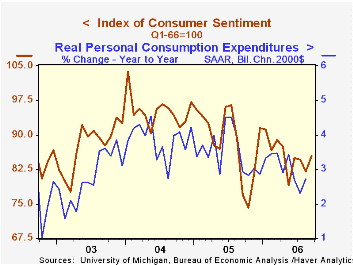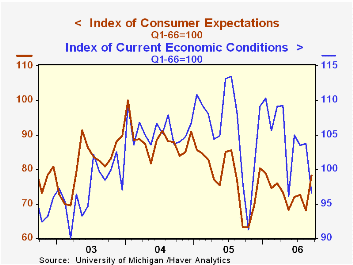 Global| Sep 29 2006
Global| Sep 29 2006U.S. Consumer Sentiment Rose As Inflation Expectations Fell
by:Tom Moeller
|in:Economy in Brief
Summary
Consumer sentiment for all of September improved, according to the University of Michigan. The full month reading recouped all an August decline and rose 4.1% to 85.4, up from a mid-month read of 84.4. Consensus expectations had been [...]

Consumer sentiment for all of September improved, according to the University of Michigan. The full month reading recouped all an August decline and rose 4.1% to 85.4, up from a mid-month read of 84.4. Consensus expectations had been for an increase to 85.2.
During the last ten years there has been a 77% correlation between the level of consumer sentiment and the y/y change in real consumer spending and during those ten years sentiment has a 68% correlation with the change in nonfarm payrolls.
Expected inflation during the next year fell sharply to 3.6% from 4.6%, its lowest level since February. The full month figure was unchanged from the preliminary read. The five to ten year expected rate of inflation also fell to 3.2%, reversing all of the rise during August.
Expectations for the economy surged 15.0% m/m to the highest level since January. Expected business conditions next year rose by nearly one third and over the next five years they improved sharply for the third month. The expected change in personal finances also firmed quite a bit and reversed all of the prior month's steep decline.
The reading of current economic conditions fell sharply m/m but did improve late in the month so that the figure was the lowest since June. The current read of personal finances fell for the third consecutive month (-3.9% y/y) and perceived buying conditions for large household goods fell sharply (0.0% y/y).
Consumers' opinion about gov't economic policy was unchanged for the third month (0.0% y/y).
The University of Michigan survey is not seasonally adjusted.The mid-month survey is based on telephone interviews with 250 households nationwide on personal finances and business and buying conditions. The survey is expanded to a total of 500 interviews at month end.Making the Systematic Part of Monetary Policy Transparent from the Federal Reserve Bank of Richmond is available here.
| University of Michigan | September | August | Y/Y | 2005 | 2004 | 2003 |
|---|---|---|---|---|---|---|
| Consumer Sentiment | 85.4 | 82.0 | 11.1% | 88.6 | 95.2 | 87.6 |
| Current Conditions | 96.6 | 103.8 | -1.5% | 105.9 | 105.6 | 97.2 |
| Expectations | 78.2 | 68.0 | 23.5% | 77.4 | 88.5 | 81.4 |
Tom Moeller
AuthorMore in Author Profile »Prior to joining Haver Analytics in 2000, Mr. Moeller worked as the Economist at Chancellor Capital Management from 1985 to 1999. There, he developed comprehensive economic forecasts and interpreted economic data for equity and fixed income portfolio managers. Also at Chancellor, Mr. Moeller worked as an equity analyst and was responsible for researching and rating companies in the economically sensitive automobile and housing industries for investment in Chancellor’s equity portfolio. Prior to joining Chancellor, Mr. Moeller was an Economist at Citibank from 1979 to 1984. He also analyzed pricing behavior in the metals industry for the Council on Wage and Price Stability in Washington, D.C. In 1999, Mr. Moeller received the award for most accurate forecast from the Forecasters' Club of New York. From 1990 to 1992 he was President of the New York Association for Business Economists. Mr. Moeller earned an M.B.A. in Finance from Fordham University, where he graduated in 1987. He holds a Bachelor of Arts in Economics from George Washington University.
More Economy in Brief
 Global| Feb 05 2026
Global| Feb 05 2026Charts of the Week: Balanced Policy, Resilient Data and AI Narratives
by:Andrew Cates






